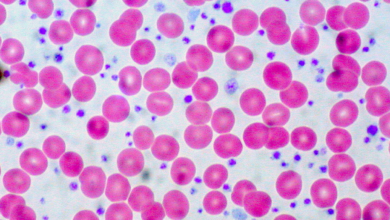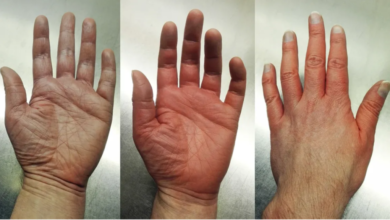
What is Myeloproliferative Neoplasms (MPNs)?
Myeloproliferative neoplasms (MPNs) are a group of rare blood cancers that cause the bone marrow to produce too many blood cells. This overproduction can lead to an enlarged spleen, an increased risk of blood clots, and other complications.
Types of Myeloproliferative Neoplasms (MPNs)
There are several types of MPNs, including:
• Chronic myeloid leukemia (CML): Characterized by the Philadelphia chromosome, a specific genetic abnormality.
• Polycythemia vera (PV): Causes the bone marrow to produce too many red blood cells.
• Essential thrombocythemia (ET): Causes the bone marrow to produce too many platelets.
• Primary myelofibrosis (PMF): Causes scarring of the bone marrow, leading to decreased blood cell production.
Symptoms of Myeloproliferative Neoplasms (MPNs)
Symptoms of MPNs can vary depending on the specific type and the severity of the disease. Some common symptoms include:
• Fatigue
• Weakness
• Splenomegaly (enlarged spleen)
• Night sweats
• Weight loss
• Easy bleeding or bruising
• Frequent infections
Causes of Myeloproliferative Neoplasms (MPNs)
The exact cause of MPNs is unknown. However, genetic mutations play a significant role in the development of these disorders.
Who Can Suffer from Myeloproliferative Neoplasms (MPNs)?
MPNs can affect people of all ages, but they are more common in adults.
Diagnostic Tests for Myeloproliferative Neoplasms (MPNs)
To diagnose MPNs, a doctor may use a combination of tests, including:
• Complete blood count (CBC): To check for abnormalities in the blood cells.
• Bone marrow aspiration and biopsy: To examine bone marrow cells.
• Cytogenetic analysis: To identify specific genetic abnormalities.
• Molecular testing: To detect specific genetic mutations.
Stages of Myeloproliferative Neoplasms (MPNs)
The staging of MPNs varies depending on the specific type. For example, CML is often staged based on the phase of the disease (chronic phase, accelerated phase, or blast crisis).
Treatment of Myeloproliferative Neoplasms (MPNs)
The treatment for MPNs depends on the specific type and stage of the disease. Common treatment options include:
• Targeted therapy: Drugs that target specific proteins involved in cancer cell growth.
• Chemotherapy: To kill cancer cells.
• Stem cell transplantation: To replace damaged bone marrow with healthy stem cells.
• Bloodletting: To reduce the number of blood cells.
Diet and Myeloproliferative Neoplasms (MPNs) Prevention
While a healthy diet can support overall health and strengthen the immune system, it cannot directly prevent MPNs. However, maintaining a balanced diet can help manage symptoms and improve quality of life.
Here are some general dietary recommendations:
• A balanced diet: A diet rich in fruits, vegetables, and whole grains can help.
• Limit processed foods and sugary drinks: These can contribute to weight gain and other health problems.
• Maintain a healthy weight: Obesity is linked to an increased risk of certain health conditions.
Overall Survival Rate of Myeloproliferative Neoplasms (MPNs)
The overall survival rate for MPNs varies depending on the specific type and stage of the disease. With advancements in treatment, the prognosis for many people with MPNs has improved significantly.
Doctor to Consult
A hematologist-oncologist is the best doctor to consult for MPNs.
Diseases Associated with Myeloproliferative Neoplasms (MPNs)
MPNs are not directly associated with other specific diseases. However, certain genetic factors can increase the risk of developing MPNs.
How to Prevent Myeloproliferative Neoplasms (MPNs)
While there’s no guaranteed way to prevent MPNs, maintaining a healthy lifestyle can reduce the risk of certain factors that may contribute to the disease:
• Limit exposure to radiation and certain chemicals: Exposure to these substances can increase the risk of certain types of cancer.
• Maintain a healthy weight: Obesity is linked to an increased risk of certain health conditions.
• Regular check-ups: Regular check-ups can help detect any abnormalities early on.
• Healthy lifestyle: A healthy lifestyle, including a balanced diet and regular exercise, can help boost the immune system.
Overall Survival Rate of Myeloproliferative Neoplasms (MPNs)
The overall survival rate for MPNs varies depending on the specific type and stage of the disease. However, with advancements in treatment, particularly targeted therapies, the prognosis for many patients has improved significantly. Early detection and timely treatment are crucial for better outcomes.
Doctor to Consult
A hematologist-oncologist is the best doctor to consult for MPNs.
Diseases Associated with Myeloproliferative Neoplasms (MPNs)
While MPNs themselves are not directly associated with other specific cancers, they can sometimes transform into more aggressive blood cancers, such as acute myeloid leukemia (AML).
How to Prevent Myeloproliferative Neoplasms (MPNs)
Unfortunately, there’s no definitive way to prevent MPNs as they are often caused by specific genetic mutations. However, maintaining a healthy lifestyle can help support overall health and may indirectly reduce the risk of certain health conditions.
Here are some general tips:
• Maintain a healthy weight: Obesity is linked to an increased risk of certain health conditions.
• Regular exercise: Regular physical activity can help maintain a healthy weight and improve overall health.
• Balanced diet: A balanced diet rich in fruits, vegetables, and whole grains can support the immune system.
• Limit alcohol consumption: Excessive alcohol consumption can increase the risk of certain health problems.
• Avoid smoking: Smoking is a major risk factor for various health conditions, including cancer.
• Regular check-ups: Regular check-ups with a healthcare provider can help detect any abnormalities early on.





